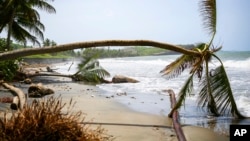The United States is committed to supporting sustainable, inclusive economic growth across the Caribbean region.
Today, one of the great challenges facing the people of the Caribbean is how to weather the impacts of climate change. “Over the last two decades, countries in Latin America and the Caribbean have lost the equivalent of 1.7 percent of GDP each year on average due to climate related disasters,” said USAID Deputy Administrator Isobel Coleman.
A recent study by the International Monetary Fund noted that the effort to adapt to climate change will require an investment of more than $100 billion, or one third of the Caribbean region’s economic output, to modernize its power generation and transmission systems and strengthen its infrastructure.
But that’s still just a drop in the bucket when one considers that it will take around one trillion dollars in financing over the next six years to prepare developing and emerging economies, excluding China, to meet their climate goals.
“There’s simply no way to meet the requirements of climate financing without a sharp increase in private sector investment,” said Deputy Administrator Coleman. “So, at USAID and across the U.S. government, we are innovating to help guide, shape, and enable the way private resources are invested to maximize development impact,” she said.
“Over the last seven years, INVEST, our global blended finance program, has demonstrated the power of such partnerships, unlocking nearly $1.6 billion in private capital to date to drive inclusive growth in countries where USAID works, including here in the Caribbean.”
The U.S. government launched a number of initiatives to improve climate change adaptation and resilience in the Caribbean region, including the Caribbean Climate Investment Program, and the Caribbean Community Resilience Fund.
“While governments are not always equipped to make the kind of large-scale climate investments we need, they are often well positioned to devote public resources toward reducing the risk of these investments, cultivating a more promising environment for investors with available capital,” said Deputy Administrator Coleman.
“The future of development – and the only path to meeting the immense needs of our time – is a collaborative approach that links the public and private sectors as partners. In this approach lies great opportunity, increasing prosperity, and the kind of world we want to bestow upon generations to come.”














